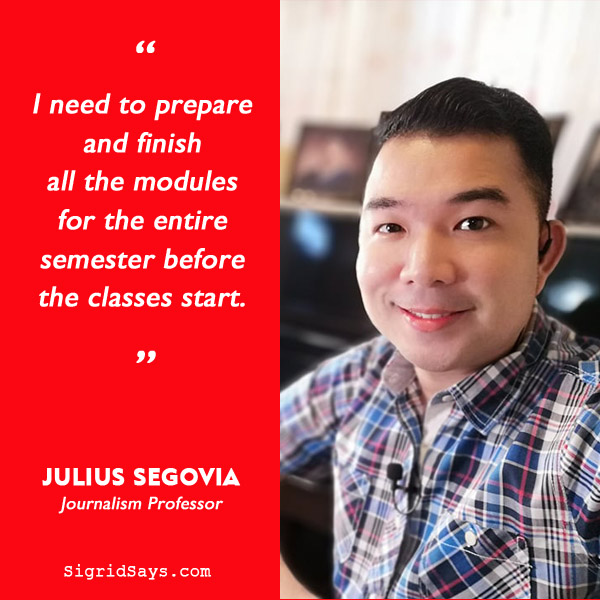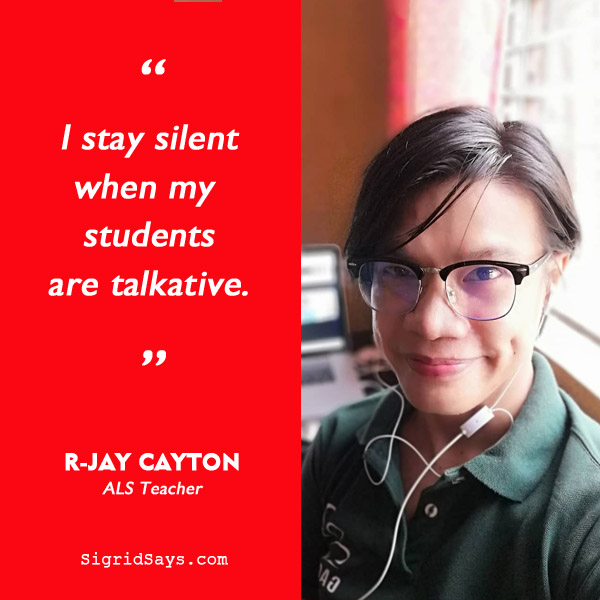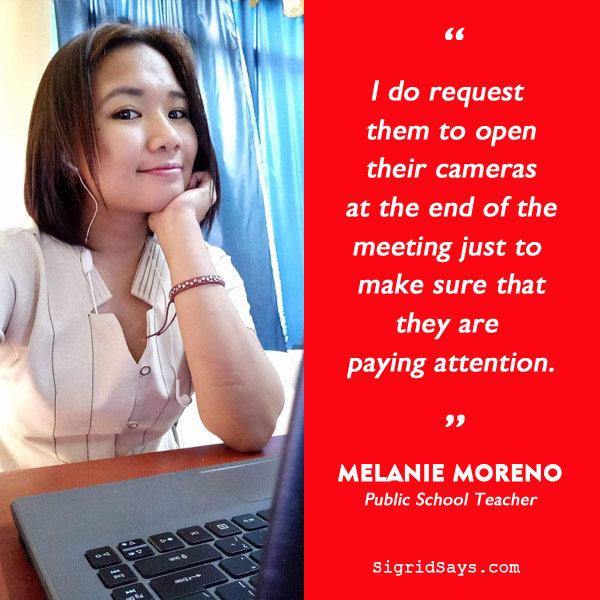Happy Teacher’s Day to all educators, including homeschooling moms and supervisors in the Philippines! In the new normal brought by Covid-19, let’s look at how teachers are dealing with the paradigm shift in education. How are our educators taking in the new tasks added to their already heavy workload?
The Paradigm Shift in Education in the Philippines
The educational systems here and abroad took a heavy beating from the COVID-19 pandemic. Needless to say, the paradigm shift in education has made everyone scramble for a safe haven.

We often hear of students and parents struggling with online learning. However, teachers have their fair share of challenges as well.
Teachers have to make sure that the quality of learning remains even with the absence of face-to-face interactions. From the preparation of lesson plans, to actually conducting the classes, and handing out of assignments, the process should be seamless.
Like the students and parents, teachers would probably say, “the struggle is real.”
A Different Approach to Teaching
One of these teachers in the new normal is former TV reporter and anchor, Julius Segovia, who teaches various communications subjects in college. Specifically, he handles TV Production, Journalism Principles, Visual Journalism, Multimedia Performance, and News Production.
Julius teaches in four different universities. Before the pandemic, he prepared his lessons a few days before they are delivered to his students. This time, he shares that his lead time has to be longer.

“You need to prepare and finish all the modules for the entire semester before the classes start,” Julius reveals.
Another journalism teacher, Melanie Moreno, agrees that she has to hurdle many obstacles in conducting her classes. She does not only need to keep things in order but she also has to ensure that learning is happening.
“Preparing lessons during this pandemic is way more challenging. Concerns include making sure that learning is happening to the learners and also that lessons are actually delivered.” Melanie teaches in a public high school in Cavite.
Meanwhile, R-Jay Cayton, a teacher in the Alternative Learning System (ALS), finds pre-work more complicated than before.
“The planning part is more complex now since classes are online. My audio-visual materials, camera, and microphone need to be tested at least two days before my actual class.” Before, it only took him a day to prepare his visual aids. R-Jay teaches basic education-level English to mostly adult learners.
Challenging Conduct of Classes
As a TV reporter and online show host, Julius is used to talking in front of the camera. He knows that his messages get across because of people’s comments.
That’s not necessarily the case for online classes.

Like any other teacher, Julius is used to interacting with students face-to-face. He knows that he may not be getting the same feedback from his students as in the classroom.
“Students are not required to open their camera because it consumes bigger bandwidth. I am not sure if I am really talking to my students or I am just doing a monologue,” he explains.
Julius also points out obstacles in blended learning sessions. There is also the mix of online and onsite classes, as directed by the Commission on Higher Education.
“[Students] are given modules in lieu of virtual meetings. Meaning, you have students with different learning modalities,” he says. It can get confusing for the teacher.
Classes Start October 5
Classes for public schools are set to begin October 5, which also happens to be World Teachers’ Day. But even before this, Melanie already conducted a dry-run of her online class, particularly for her Grade 10 students. This enabled her to identify issues that have to be addressed.
Like probably many teachers, Melanie describes this “impersonal” method of learning as quite challenging.
“It takes a lot of reflective thinking and assessment since you would need to develop a uniform material addressing the needs of a diverse audience. I believe that [developers of Alternative Delivery Mode] learning materials should therefore be very adept with the craft.”
Internet issue
The teachers themselves are saying that having good internet connectivity is a major issue in online learning.
“Not all families can actually afford the expenses [of securing a stable internet connection]. The internet stability in our country is [also] really challenging. [Limited] teacher presence affects the learning of the students according to studies,” Melanie says.
Aside from fluctuating internet connection, R-Jay is also bothered by the unnecessary background noises he hears. These are distractions to both teachers and students.
Shift in Evaluating Students’ Learning
It’s common for teachers to give out seat works and quizzes inside the classroom. Since there’s practically no classroom to speak of this schoolyear, teachers had to make many adjustments.
“I am lenient in terms of deadlines. I give ample time for the students to finish the required output, but we strictly follow protocols on late submissions. They get deductions if they submit late,” Julius says.
“If they get to submit a superb TV or radio material, then it means they have learned something from me,” he tells.
Melanie’s early preparations have had its gains so far.
“Even before the opening of classes, [my learners and I] have been engaging in different online projects. We struggled at first. As time went by, we were able to establish an organized system only using FB and Messenger. [These apps] are accessible even without internet data compared to other educational applications,” she shares.
Managing Virtual Classroom Behavior
Keeping an entire class attentive has always been a challenge for teachers, especially in the basic education levels. But the “new normal” gave it a whole new dimension.
Like Julius’s students, not all of Melanie’s turn on their cameras. But still, teachers find ways to manage their class’ behavior.

“I engage them in discussions. Sometimes, I do request them to open their cameras at the end of the meeting. Just to make sure that they are paying attention. Aside from that, their outputs reflect whether they have learned not,” Melanie says.
Meanwhile, R-Jay keeps his students in check by staying silent when they are talkative.
Hopes for the “New Normal” in Education
In the end, the teachers can only hope. They hope that online classes and blended learning will turn out to be beneficial to students.
“I hope students would realize that they should work hand in hand with their teachers for online classes. Ika nga, kailangang magtulungan para maisakatuparan ang lahat ng ito. Hindi biro ang blended learning approach sa mga bata. [In the] same way, challenge din ito para sa mga guro, especially sa mga hindi techie,” Julius says.
Meanwhile, Teacher Melanie shares. “With careful planning, honest and realistic feedback for processing, I believe that education will still push through effectively. It just takes adaptability and synergy, as life should not end with the virus. It should rather open broader and more positive possibilities without compromising the precious lives of teachers, students, and stakeholders.”

R-Jay’s students may already be of age. But he still hopes that the sudden changes won’t hamper adults from continued learning.
“I hope my students would value themselves more, so they can dream bigger for themselves.” He believes that education promotes equity.
Salute and Commitment from BDO
The work of our teachers in shaping the minds of the nation is in itself a sacrifice. It is also an act of love because it requires time, attention, and patience. These have doubled, maybe even tripled, in this pandemic.
Clearly, teachers have been finding ways to continue their students’ learning process and they refuse to give up on their calling.
BDO is one with them in steadily serving the community through these tough times.
In its commitment to continued education amidst the pandemic, its rural banking arm, BDO Network Bank, supports the health and safety campaign of DepED for teachers and learners.
They are donating P1 million worth of rubbing alcohol and washable face masks that will benefit 1,105 public schools. This will be channelled under the Brigada Eskwela program.
Employees’ Share
Under the Brigada Eskwela program, the BDO Network Bank employees were encouraged to donate items like school shoes, bags, and school supplies. These will be for the benefit of the teachers and students.
Furthermore, P420,000 worth of ICT equipment (laptops, desktops, and scanners) were turned over to DepEd. This was made possible through the rural bank’s partnership with BDO Foundation and SM Foundation.
In addition, BDO Network Bank donated P1.4 million worth of bond papers under the Adopt-a-School program.
Like the dedicated Filipino teachers, BDO looks forward to getting through the pandemic. They shared in the commitment to improve learning experiences even while staying at home.
Health Tip
Online classes are paving the way for a sedentary lifestyle for teachers and students. Remember to incorporate stretching in between class periods.

Sitting in front of the computer for long periods of time can lead to back and neck pains as well as other lifestyle ailments.
You may also like
7 Tech Solutions to Familiarize Yourself With for Your New HR Career
Stain and Scratch-Resistant realme C63 Now Available for P8,999
BDO Says: Clients Should Stay Calm and Vigilant to Avoid Scams
Manage Work-Life with Logitech Signature Slim K950 Wireless Keyboard
AI Portrait Master HONOR 200 Series is Coming Soon in PH

Halos lahat talaga nag-struggle sa unang mga araw ng online class (new normal) momsh. Lalo na sa bansa natin mahina yung internet connection. Pero nakakatuwa padin na madami pading teachers na matyagang nagtuturo at nagga-guide sa mga kids para makasabay sa online classes. Salute to all the teachers!
This is an interesting topic,it is the new normal way of teaching,as a mom,I owe teachers,and educators my respect ,how difficult for them,for we are now , adapting a new way of learning and teaching, thanks BDO ,also for this campaign